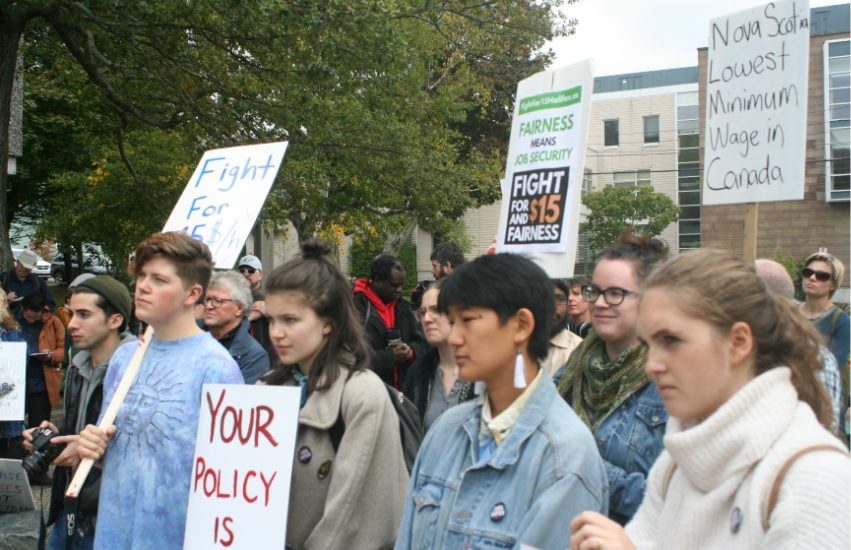
KJIPUKTUK (Halifax) – The WE Charity and its personal connection to the Trudeaus is not the only controversy surrounding the Canada Student Service Grant (CSSG); a program aiming to fill employment gaps by encouraging young people to volunteer for not-for-profit organizations.
Although the initiative claims to benefit the student population, it will lead to their exploitation and further aggravate the growing issue of precarious employment in Nova Scotia and beyond.
By classifying student workers as volunteers, the federal government program denies them the basic employment protections set out by the provinces they are working in. Most dangerously, it exempts student participants from earning a minimum wage.
The grant offers those eligible a one-time payment available at five levels, ranging from $1,000 to $5,000. $1,000 is paid for every 100-hours of student labour. At a wage rate of $10 per hour, the program allows young workers to be paid less than minimum wage in every provincial jurisdiction.
In fact, an hour of student labour under this program may be valued at even less than $10 per hour. This is because the grant is calculated using 100-hour thresholds, and hours worked are rounded down. If a student were to work 195-hours, for example, they would only be entitled to a taxable $1,000 payment. This could have dangerous and unfair financial consequences for students involved.
To earn the full $5,000 available before they return to school, student participants will have to work over 50-hours per week (more than full-time hours), without entitlement to overtime pay.
The minimum wage in Nova Scotia is already enormously inadequate. At $12.55 per hour, minimum wage earners are paid almost $7 per hour less than a living wage in the city Halifax. Wages of $10 per hour, or less, will leave many struggling.
See also: A living wage for Halifax and Antigonish
“This is jarring for students in Halifax, where the rents are soaring and the vacancy rate leads to non-existent bargaining power,” says Jeremy Hebb, a second-year student at St. Mary’s University in the Bachelor of Arts program. “The large number of students in Halifax who work jobs and collected the CERB remain ineligible and the ones who don’t aren’t typically the ones who needed help in the first place.”
Although the Canada Student Service Grant program is run by the federal government, it may well violate Nova Scotia’s provincial employment legislation. Legally speaking, “employment” is determined by factors such as the degree of control exercised over work activities, an application process, and a set rate of payment. Work conducted under CSSG meets this criterion. Students involved may therefore be employees, not volunteers, in which case they would be entitled to the minimum provincial employment protections. This includes the right to earn minimum wage and overtime pay, but also to have their employer contribute to Canada Pension Plan and Employment Insurance.
Unfortunately, the legal issues the program raises may go unnoticed by the population it targets. Inexperienced workers tend to be less knowledgeable of their workplace rights than those with years of employment experience. They may also be less aware of how to access the legal support and information needed to challenge unfair treatment.
“It sends a message that the work of students is less valuable and their contributions aren’t worth properly compensating,” says Hebb. “There’s just so many more equitable ways to help out students and it shows the tone-deaf ignorance of our elected officials and their pals working highly compensated jobs at charities.”
Another point of concern is that CSSG excludes international students, who make up nearly 30% of the post-secondary student population in Canada, and who contribute enormously to the national economy. Not only are international students exempt from CSSG but are also excluded from other student-focused initiatives like the Canada Emergency Student Benefit and the Canada Summer Jobs program.
“After being left out of the CESB, these students now find themselves ineligible for this program,” says Hebb. “If the goal is to help both charities and students, the restrictions on eligibility are senseless and unfounded in reality. By encouraging our over seven thousand international students to volunteer, the alleged gaps that the government is trying to address through the program would be instantly filled.”
Hebb has no problem with students being offered grants for volunteer hours. “However, when charities start laying off employees and replacing them with government subsidized students… that doesn’t solve anything.”
On June 25, 2020, the Canada Federation of Students released a statement about CSSG and argued that, instead, the federal government should implement a universal benefit for all students, including international students.
See also: Overpriced and underserved: St Mary’s University’s response to COVID-19 gets a failing grade
With a special thanks to our generous donors who make publication of the Nova Scotia Advocate possible.
Subscribe to the Nova Scotia Advocate weekly digest and never miss an article again. It’s free!



